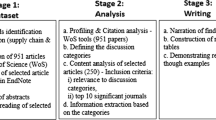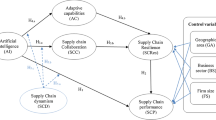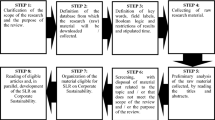Abstract
Sustainability challenges are getting lot of attention in manufacturing sector and they usually require the use of institutional pressures. Firms in turn, respond to these pressures by instituting assessment and collaboration mechanisms for their suppliers who hold pivotal roles in their supply chains. This paper investigates the effectiveness of coercive pressures and mimetic pressures in implementing supplier assessment and supplier collaboration mechanisms by the firms. This research also uncovers the inter-relationship of the two mechanisms in the presence of these pressures. Data were collected from 97 manufacturing firms that outsource their supplies to different organizations across the world. Structural Equation Modelling is employed through the use of Smart-PLS. The results show a fully mediated relationship of coercive pressures with supplier collaboration through supplier assessment. This paper suggests important managerial implications for firms addressing supplier mechanisms for environmental purposes. This paper contributes to the existing literature of Institutional Theory within the domain of greening suppliers.


Similar content being viewed by others
References
Ahmed W, Ashraf MS, Khan SA, Kusi-Sarpong S, Arhin FK, Kusi-Sarpong H, Najmi A (2020) Analyzing the impact of environmental collaboration among supply chain stakeholders on a firm’s sustainable performance. Oper Manag Res 13:4–21
Armstrong JS, Overton TS (1977) Estimating nonresponse bias in mail surveys. J Market Res 14(3):396–402
Borchardt M, Wendt MH, Pereira GM, Sellitto MA (2011) Redesign of a component based on ecodesign practices: environmental impact and cost reduction achievements. J Clean Prod 19(1):49–57
Bromley P, Powell WW (2012) From smoke and mirrors to walking the talk: Decoupling in the contemporary world. Acad Manag Ann 6(1):483–530
Caprar DV, Neville BA (2012) “Norming” and “conforming”: Integrating cultural and institutional explanations for sustainability adoption in business. J Bus Ethics 110(2):231–245
Chen IJ, Paulraj A, Lado AA (2004) Strategic purchasing, supply management, and firm performance. J Oper Manag 22(5):505–523
Chin WW, Newsted PR (1999) Structural equation modeling analysis with small samples using partial least squares. Stat Strateg Small Sample Res 1(1):307–341
Choi D, Hwang T (2015) The impact of green supply chain management practices on firm performance: the role of collaborative capability. Oper Manag Res 8(3–4):69–83
Coltman T, Devinney TM, Midgley DF, Venaik S (2008) Formative versus reflective measurement models: Two applications of formative measurement. J Bus Res 61(12):1250–1262
Dar MS, Ahmed S, Raziq A (2017) Small and medium-size enterprises in Pakistan: Definition and critical issues
DiMaggio P, Powell WW (1983) The iron cage revisited: Collective rationality and institutional isomorphism in organizational fields. Am Sociol Rev 48(2):147–160
Dubey R, Gunasekaran A, Childe SJ, Papadopoulos T, Fosso Wamba S (2017) World class sustainable supply chain management: critical review and further research directions. Int J Logist Manag 28(2):332–362
Dwaikat NY, Money AH, Behashti HM, Salehi-Sangari E (2018) How does information sharing affect first-tier suppliers’ flexibility? Evidence from the automotive industry in Sweden. Prod Plan Control 29(4):289–300
Edelman LB (1992) Legal ambiguity and symbolic structures: Organizational mediation of civil rights law. Am J Sociol 97(6):1531–1576
Gavronski I, Klassen RD, Vachon S, do Nascimento, L. F. M. (2011) A resource-based view of green supply management. Transportation Research Part E: Logistics and Transportation Review 47(6):872–885
Geffen CA, Rothenberg S (2000) Suppliers and environmental innovation: the automotive paint process. Int J Oper Prod Manag 20(2):166–186
Gimenez C, Sierra V (2013) Sustainable supply chains: Governance mechanisms to greening suppliers. J Bus Ethics 116(1):189–203
Gimenez C, Tachizawa EM (2012) Extending sustainability to suppliers: a systematic literature review. Supply Chain Manag: Int J 17(5):531–543
Ginsberg A, Venkatraman N (1985) Contingency perspectives of organizational strategy: A critical review of the empirical research. Acad Manag Rev 10(3):421–434
Goodland R, Daly H (1996) Environmental sustainability: universal and non-negotiable. Ecol Appl 6(4):1002–1017
Govindan K, Rajendran S, Sarkis J, Murugesan P (2015) Multi criteria decision making approaches for green supplier evaluation and selection: a literature review. J Clean Prod 98:66–83
Green K, Morton B, New S (1996) Purchasing and environmental management: interactions, policies and opportunities. Bus Strateg Environ 5(3):188–197
Green K, Morton B, New S (1998) Green purchasing and supply policies: do they improve companies’ environmental performance? Supply Chain Manag: Int J 3(2):89–95
Hahn CK, Watts CA, Kim KY (1990) The supplier development program: a conceptual model. J Purch Mater Manag 26(2):2–7
Hair JF Jr, Tatham RL, Anderson RE (1998) Multivariate Data Analysis, 5th edn. Prentice Hall, New Jersey
Hair JF Jr, Black WC, Babin BJ, Anderson RE, Tatham RL (2006) Multivariate data analysis, 6th edn. Pearson Prentice Hall, New Jersey
Hair JF Jr, Hult GTM, Ringle C, Sarstedt M (2016) A primer on partial least squares structural equation modeling (PLS-SEM), 1st Edition. Sage Publications
Hair JF Jr, Hult GTM, Ringle C, Sarstedt M (2017) A primer on partial least squares structural equation modeling (PLS-SEM), 2nd Edition. Sage Publications
Handfield R, Walton SV, Sroufe R, Melnyk SA (2002) Applying environmental criteria to supplier assessment: A study in the application of the Analytical Hierarchy Process. Eur J Oper Res 141(1):70–87
He P, Shen H, Zhang Y, Ren J (2019) External pressure, corporate governance, and voluntary carbon disclosure: Evidence from China. Sustainability 11(10):2901
Henisz WJ, Delios A (2001) Uncertainty, imitation, and plant location: Japanese multinational corporations, 1990–1996. Adm Sci Q 46(3):443–475
Henseler J, Ringle CM, Sarstedt M (2015) A new criterion for assessing discriminant validity in variance-based structural equation modeling. J Acad Mark Sci 43(1):115–135
Hoejmose SU, Adrien-Kirby AJ (2012) Socially and environmentally responsible procurement: A literature review and future research agenda of a managerial issue in the 21st century. J Purch Supply Manag 18(4):232–242
Kauppi K (2013) Extending the use of institutional theory in operations and supply chain management research: Review and research suggestions. Int J Oper Prod Manag 33(10):1318–1345
Ketokivi MA, Schroeder RG (2004) Strategic, structural contingency and institutional explanations in the adoption of innovative manufacturing practices. J Oper Manag 22(1):63–89
Krause DR, Scannell TV, Calantone RJ (2000) A structural analysis of the effectiveness of buying firms’ strategies to improve supplier performance. Decis Sci 31(1):33–55
Krause DR, Vachon S, Klassen RD (2009) Special topic forum on sustainable supply chain management: Introduction and reflections on the role of purchasing management. J Supply Chain Manag 45(4):18–25
Lai KH, Wong CW, Cheng TE (2006) Institutional isomorphism and the adoption of information technology for supply chain management. Comput Ind 57(1):93–98
Lambert DM, Harrington TC (1990) Measuring nonresponse bias in customer service mail surveys. J Bus Logist 11(2):5–25
Large RO, Gimenez T (2011) Drivers of Green Supply Management Performance: Evidence from Germany. J Purch Supply Manag 17:176–184
Lei PW, Wu Q (2007) Introduction to structural equation modeling: Issues and practical considerations. Educ Meas: Issues Pract 26(3):33–43
León-Bravo V, Caniato F, Caridi M (2019) Sustainability in multiple stages of the food supply chain in Italy: practices, performance and reputation. Oper Manag Res 12(1–2):40–61
Marano V, Kostova T (2016) Unpacking the institutional complexity in adoption of CSR practices in multinational enterprises. J Manag Stud 53(1):28–54
Meyer JW, Rowan B (1977) Institutionalized organizations: Formal structure as myth and ceremony. Am J Sociol 83(2):340–363
Min H, Galle WP (1997) Green purchasing strategies: trends and implications. J Supply Chain Manag 33(2):10–17
Mizruchi MS, Fein LC (1999) The social construction of organizational knowledge: A study of the uses of coercive, mimetic, and normative isomorphism. Adm Sci Q 44(4):653–683
Murray JG (2000) Effects of a green purchasing strategy: the case of Belfast city council. Supply Chain Manag: Int J 5(1):37–44
Paulraj A, Blome C (2017) Plurality in environmental supply chain mechanisms. Int J Oper Prod Manag 37(8):1010–1030
Preacher KJ, Hayes A (2008) Asymptotic and resampling strategies for assessing and comparing indirect effects in multiple mediator models. Behav Res Methods 40(3):879–891
Rao P, Holt D (2005) Do green supply chains lead to competitiveness and economic performance? Int J Oper Prod Manag 25(9):898–916
Richter NF, Cepeda-Carrión G, Roldán Salgueiro JL, Ringle CM (2016) European management research using partial least squares structural equation modeling (PLS-SEM). Eur Manag J 34(6):589–597
Rigdon EE, Sarstedt M, Ringle CM (2017) On comparing results from CB-SEM and PLS-SEM: Five perspectives and five recommendations. Marketing ZFP 39(3):4–16
Rivera J (2004) Institutional pressures and voluntary environmental behavior in developing countries: Evidence from the Costa Rican hotel industry. Soc Nat Resour 17(9):779–797
Rogers KW, Purdy L, Safayeni F, Duimering PR (2007) A supplier development program: rational process or institutional image construction? J Oper Manag 25(2):556–572
Saeed A, Jun Y, Nubuor SA, Priyankara HPR, Jayasuriya MPF (2018) Institutional pressures, green supply chain management practices on environmental and economic performance: A two theory view. Sustainability 10(5):1517
Sancha C, Longoni A, Giménez C (2015) Sustainable supplier development practices: Drivers and enablers in a global context. J Purch Supply Manag 21(2):95–102
Sancha C, Gimenez C, Sierra V (2016) Achieving a socially responsible supply chain through assessment and collaboration. J Clean Prod 112(3):1934–1947
Sánchez-Rodríguez C, Hemsworth D, Martínez-Lorente ÁR (2005) The effect of supplier development initiatives on purchasing performance: a structural model. Supply Chain Manag: Int J 10(4):289–301
Schliephake K, Stevens G, Clay S (2009) Making resources work more efficiently–the importance of supply chain partnerships. J Clean Prod 17(14):1257–1263
Schoenherr T, Modi SB, Talluri S, Hult GTM (2014) Antecedents and performance outcomes of strategic environmental sourcing: an investigation of resource-based process and contingency effects. J Bus Logist 35(3):172–190
Scott WR (2015) Organizations and organizing: Rational, natural and open systems perspectives: Routledge
Scott WR, Davis GF (2007) Organizations and Organizing: Rational, Natural and Open System Perspective s. Routledge, New York
Shibin K, Dubey R, Gunasekaran A, Hazen B, Roubaud D, Gupta S, Foropon C (2017) Examining sustainable supply chain management of SMEs using resource based view and institutional theory. Ann Oper Res 290:301–326
Simpson D, Power D, Samson D (2007) Greening the automotive supply chain: a relationship perspective. Int J Oper Prod Manag 27(1):28–48
Stentoft J, Mikkelsen OS, Jensen JK (2016) Flexicurity and relocation of manufacturing. Oper Manag Res 9(3–4):133–144
Sucky E, Durst SM (2013) Supplier development: current status of empirical research. Int J Proc Manag 6(1):92–127
Tate WL, Ellram LM, Dooley KJ (2014) The impact of transaction costs and institutional pressure on supplier environmental practices. Int J Phys Distrib Logist Manag 20(5):353–372
Tenenhaus M, Vinzi VE, Chate L, Y., Lauro, C. (2005) PLS path modeling. Comput Stat Data Anal 48:159–205
Theyel G (2006) Customer and supplier relations for environmental performance Greening the supply chain (pp. 139-149): Springer
Tilcsik A (2010) From ritual to reality: Demography, ideology, and decoupling in a post-communist government agency. Acad Manag J 53(6):1474–1498
Vachon S, Klassen RD (2006) Extending Green Practices Across the Supply Chain. Int J Oper Prod Manag 26(7):795–821
Wagner SM (2006) Supplier development practices: an exploratory study. Eur J Mark 40(5–6):554–571
Walton SV, Handfield RB, Melnyk SA (1998) The green supply chain: integrating suppliers into environmental management processes. J Supply Chain Manag 34(1):2–11
Wetzels M, Odekerken-Schroder G, Oppen CV (2009) Using PLS path modeling for assessing hierarchial construct models: Guidelines and empirical illustration. MIS Q 33(1):177–195
Westphal JD, Zajac EJ (2001) Decoupling policy from practice: The case of stock repurchase programs. Adm Sci Q 46(2):202–228
Wijen F (2014) Means versus ends in opaque institutional fields: Trading off compliance and achievement in sustainability standard adoption. Acad Manag Rev 39(3):302–323
Yang F, Zhang X (2017) The impact of sustainable supplier management practices on buyer-supplier performance. Rev Int Bus Strat 27(1):112–132
Yu X (2008) Impacts of corporate code of conduct on labor standards: A case study of Reebok’s athletic footwear supplier factory in China. J Bus Ethics 81(3):513–529
Zhu Q, Sarkis J (2004) Relationships between operational practices and performance among early adopters of green supply chain management practices in Chinese manufacturing enterprises. J Oper Manag 22(3):265–289
Zhu Q, Sarkis J (2007) The moderating effects of institutional pressures on emergent green supply chain practices and performance. Int J Prod Res 45(18–19):4333–4355
Zhu Q, Sarkis J, Lai K-H (2007) Green supply chain management: pressures, practices and performance within the Chinese automobile industry. J Clean Prod 15(11–12):1041–1052
Zhu Q, Sarkis J, Lai K-H (2013) Institutional-based antecedents and performance outcomes of internal and external green supply chain management practices. J Purch Supply Manag 19(2):106–117
Zsidisin GA, Melnyk SA, Ragatz GL (2005) An institutional theory perspective of business continuity planning for purchasing and supply management. Int J Prod Res 43(16):3401–3420
Author information
Authors and Affiliations
Corresponding author
Ethics declarations
Ethics approval and consent to participate
All authors have been personally and actively involved in substantive work leading to the manuscript, and will hold themselves jointly and individually responsible for its content.
Consent for publication
The manuscript is not currently being considered for publication in another journal.
Conflict of interest
We further declare that there is no conflict of interest.
Additional information
Publisher’s Note
Springer Nature remains neutral with regard to jurisdictional claims in published maps and institutional affiliations.
Rights and permissions
About this article
Cite this article
Khurshid, A., Muzaffar, A. & Bhutta, M.K. Institutional pressures and supplier involvement: a perspective on sustainability. Oper Manag Res 14, 123–137 (2021). https://doi.org/10.1007/s12063-021-00181-4
Received:
Revised:
Accepted:
Published:
Issue Date:
DOI: https://doi.org/10.1007/s12063-021-00181-4





